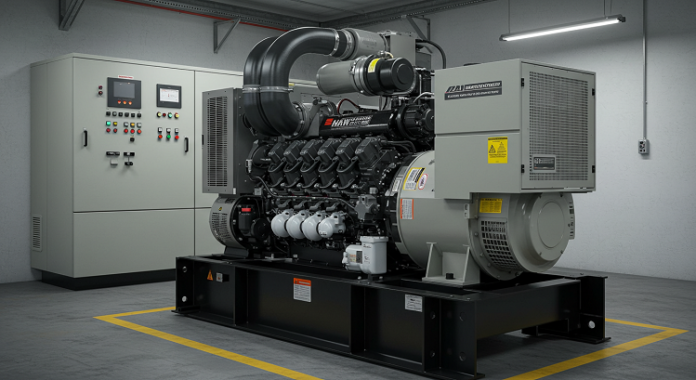Generators meant for industrial applications ensure a steady power supply for businesses in sectors like manufacturing, healthcare, and data management. Diesel, Natural Gas, Bi-Fuel, and Hydrogen Fuel Cell Power Generators provide reliable energy solutions tailored to different operational needs. These systems maintain consistent electricity, minimize disruptions, and support critical functions. The following article discusses their key benefits and explains their role in delivering dependable power.
Uninterrupted Power for Critical Operations
The topmost benefit of industrial generators is that they deliver continuous electricity to support essential operations. In facilities such as hospitals or production plants, interruptions can halt vital processes. The systems activate swiftly during outages, supplying stable energy to keep equipment operational. This reliability protects sensitive machinery, maintains production timelines, and upholds safety standards. Businesses can depend on these units to provide electricity without delay, ensuring seamless operations.
Flexible Fuel Options for Diverse Needs
Multiple fuel types enhance the versatility of these generators. Those that run on diesel utilize widely available diesel and are ideal for high-demand applications. Natural Gas ones function with clean-burning fuel, which makes them suitable for facilities with gas infrastructure. Those that are powered by bi-fuel combine diesel and gas, offering adaptable fuel sourcing. Hydrogen Fuel Cell engines harness hydrogen, providing an innovative solution for settings. This variety allows businesses to choose systems that match their resources and requirements.
Enhanced Redundancy with Modular Systems
Modular designs improve reliability through built-in redundancy. These configurations use multiple units that work together, ensuring power continuity if one component fails. This feature is critical for applications like data centers, where downtime incurs significant costs. Modular setups allow maintenance or replacement without disrupting the electricity supply. Such systems provide businesses with confidence in consistent energy delivery. Flexible configurations also support quick adjustments to meet operational demands.
Scalable Solutions for Growing Demands
Generators meant for industrial uses offer scalability to accommodate increasing power needs. As businesses grow or energy demands rise, these systems can be expanded to handle higher loads. Additional units can be integrated into modular designs, or larger generators can be deployed to meet new requirements. This adaptability ensures that industries, from small facilities to large complexes, maintain reliable capacity as operations evolve. Scalable systems also support phased expansions, aligning with long-term business planning. This flexibility reduces the need for frequent system overhauls, saving time and resources.
High Efficiency for Cost Savings
Efficiency in these generators reduces operational expenses. Advanced technology optimizes fuel use, enabling more power output with less consumption. This efficiency reduces fuel costs, particularly for industries that rely on generators for extended periods. Reduced refueling needs also simplify logistics. By prioritizing fuel economy, these systems help businesses save money while ensuring steady performance. Optimized designs further minimize energy waste, enhancing overall cost-effectiveness. Efficient operation also reduces wear on components, thereby extending the equipment’s lifespan.
Reliable Performance in Harsh Conditions
Designed for tough environments, these generators operate effectively in extreme conditions. From high temperatures to remote locations, these units deliver consistent power. Their robust construction ensures durability in settings like construction sites or disaster recovery zones. This reliability makes them a trusted choice for industries requiring uninterrupted energy in challenging circumstances. Protective enclosures safeguard components, ensuring consistent output regardless of external conditions. Specialized cooling systems maintain performance during prolonged operation in hot climates.
Lower Emissions for Environmental Compliance
Environmental regulations drive the need for cleaner solutions. Natural gas generators and Hydrogen fuel cell generators produce fewer emissions, aligning with sustainability goals. Bi-Fuel Generators balance efficiency with reduced environmental impact. These technologies help businesses comply with strict standards while maintaining dependable capacity, supporting eco-friendly operations. Advanced emission control systems further reduce pollutants, contributing to cleaner energy production. Compliance with regulations also avoids costly fines, benefiting long-term operations.
Advanced Control Systems for Easy Operation
Modern generators feature user-friendly control systems that simplify operation. Operators can monitor performance, adjust settings, and detect issues quickly. These systems provide real-time data on fuel levels, power output, and maintenance needs, enabling proactive management. Such controls reduce the need for specialized training, making it easier for businesses to maintain a reliable source of electricity. Automated alerts notify operators of potential issues, ensuring timely interventions. Remote monitoring capabilities further enhance operational oversight and efficiency.
Long-Term Durability for Reduced Maintenance
Generators meant for industrial applications are built for longevity, minimizing maintenance costs. High-quality materials and engineering ensure these units withstand prolonged use. Regular maintenance schedules are straightforward, reducing downtime and repair expenses. Durable designs enable businesses to rely on these systems for years, offering a cost-effective solution for consistent power needs. Corrosion-resistant components extend service life, even in demanding environments. Simplified maintenance procedures reduce the need for specialized technical support.
Various types of industrial generators, including Diesel, Natural Gas, Bi-Fuel, and Hydrogen Fuel Cell, offer robust solutions for reliable power across industries. Their ability to provide uninterrupted electricity, adapt to diverse fuel sources, and operate efficiently supports critical operations and long-term growth. Modular and scalable designs, combined with durable construction, ensure dependability in various conditions. These generators enable businesses to maintain productivity and resilience with a steady energy supply.
